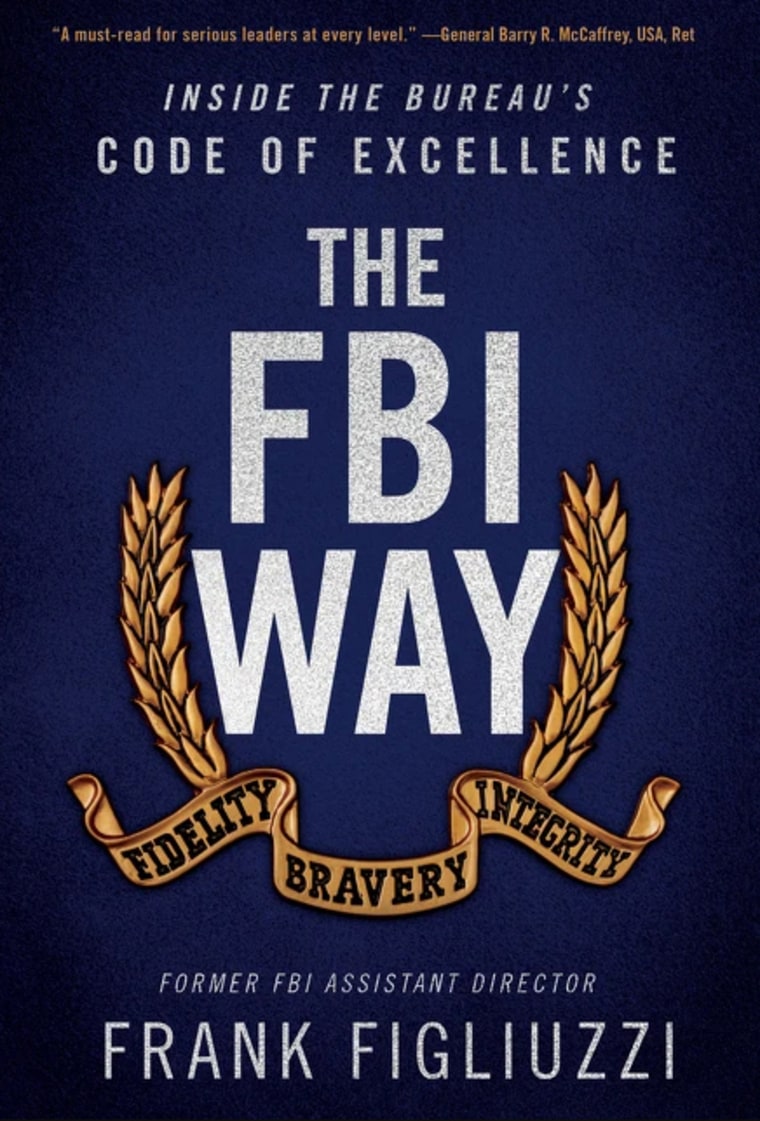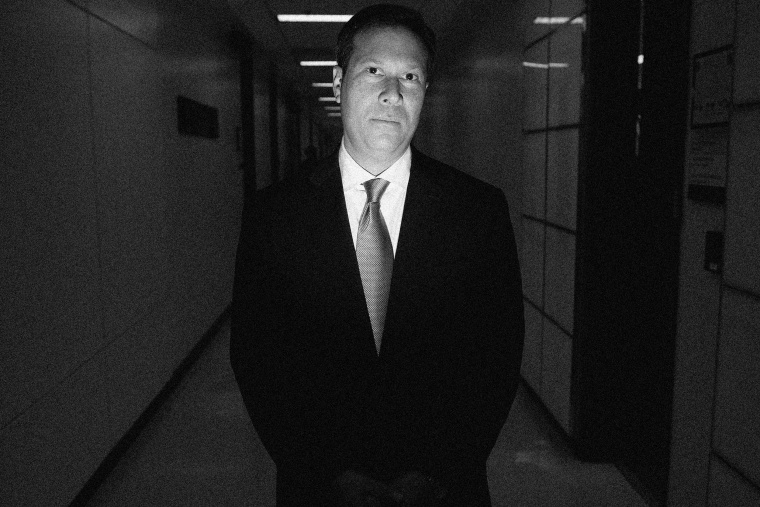NBC News national security contributor Frank Figliuzzi spent 25 years in the FBI, ending his career as the agency’s top counter intelligence official. Along the way, he hunted terrorists, helped jail corrupt local officials and policed his fellow agents as the bureau’s chief inspector.
His new book, “The FBI Way: Inside the Bureau’s Code of Excellence,” argues that the FBI has succeeded because it applies a strict code of conduct to its own. Here is a condensed version of a Q&A with NBC National Security and Intelligence Correspondent Ken Dilanian.
KEN DILANIAN
Frank, why did you become an FBI agent? And why did you spend so long inside the Bureau?
FRANK FIGLIUZZI
So it started way back when I was 11 years old. And the best I can explain it is I lived in southern Connecticut, we were in the New York media market. And I kept watching the FBI, reading the newspapers, watching the news on television, with the FBI taking down the mobsters and organized crime families. And, I thought this is pretty cool. These guys are using their brains to take down criminals and threats to society. And of course, I was watching TV shows where, you know, the FBI solved everything in one hour, including commercials. And so I decided at age 11, to write a letter to the Special Agent in Charge of the FBI in Connecticut saying, Hey, I'm an 11 year old kid, and I'd like to be an FBI agent. And lo and behold, he wrote me back. Now, I think I think at a deeper level, I was raised with a sense of right and wrong, a sense that there's justice, that needs to happen. I sense that there are forces in the world that are not good and need to be defeated. And I and I think that all contributed to it.

DILANIAN
Let's talk about the FBI way. What is the FBI's code and why do you think it works most of the time?
FIGLIUZZI
Yeah, I know, it does. In fact, I would assert that the FBI has a track record of success, leadership that's based on values, what's called values-based performance, values-based leadership. The track record of the Bureau is far greater than most fortune 100 corporations. And that's the theme of the book. I've taken 25 years of observations and absorbing from the inside how the FBI operates under extreme stress, when the stakes are the highest and gets it right. Most of the time. I've distilled that down into what I call the seven C's. The book is called “The FBI Way,” because I think it has something to offer each of us. You don't need to spend 25 years inside the FBI to glean some of the leadership lessons about what it takes to preserve your values, your family, your business, your country, when it's under severe stress. And we are under severe stress.”
DILANIAN
Let's talk about the last four years. Anybody who's been watching you regularly knows that you believe that the last four years have been incredibly difficult for the FBI. Is there any sense in which the FBI has lost its way during the Trump era?
FIGLIUZZI
So one of the things that prompted me to get this book out was I saw what I call bureau bashing, getting out of control. Now, the FBI leadership is not without blame here. And I address this in the book I address Jim Comey and his decision to call a press conference and say, quote, no reasonable prosecutor would ever bring a case against Hillary Clinton. In that moment in time, he politicized the FBI. He didn't want to, that was not his intention. He's a man of high integrity, but he forgot two things. One, the FBI is not a prosecuting agency that's across the street at the Department of Justice. Number two, he's accountable to a boss called the Attorney General of the United States, who needed to make that decision. And the fallout from that political politicizing of the bureau resulted in a less effective FBI in the eyes of the public. Because I know when you pull your credentials out and ask a member of the public for their help and cooperation in a kidnapping, a terrorist act, whatever it is, if they pause for a minute, because they can't trust the outfit, the organization, then we've all suffered from a national security standpoint. And as we speak, the FBI is knocking on doors across America, trying to prevent the next act of domestic terrorism. And we can't have citizens pausing for a moment to wonder whether these people can be trusted.
DILANIAN
And let's talk about that horrific uprising on January 6, that insurrection at the Capitol. Many people consider this an act of domestic terrorism. And I wonder if you think in any way, it was an FBI intelligence failure?
FIGLIUZZI
Right. So I've been publicly saying that this wasn't so much an intelligence failure as it was a failure to act upon available intelligence. To me the phrase intelligence failure means you didn't even see it coming. This is a situation where we all saw this coming. …NBC News has reported that the FBI did share concerns about violence with the Capitol Police with the Joint Terrorism Task Forces in the capital region. The NYPD intelligence unit shared their concerns about violence with the Capitol Police. And now we've learned there was an internal memo at the Capitol Police that said bad things could happen here. So not an intelligence failure for me, but rather a failure to act on intel and a security failure.
Most people don't understand that there is no law against domestic terrorism. There is no investigative toolkit as there is in international terrorism. So the ability to prevent this is another thing. And I've heard people say, why didn't the FBI just ring the building? And you know, in spite of the Capitol police's posture, the FBI isn't in the building protection business. They're not security guards. They're not officers responsible for that building, but they are responsible for preserving democracy and national security. And so we need some answers.
DILANIAN
This is a real spotlight moment on how the FBI handles or doesn't handle gathering intelligence on domestic extremism, domestic terrorism. They're obviously gathering a lot of intelligence right now, right, using the authorities that they have. Obviously you believe this is a question of laws and authorities, but is it also potentially a question of will and resources? All of the above?
FIGLIUZZI
I think it's very, very true, that without investigative tools to get out in front of us and monitor, chat among across hundreds of 1000s, and millions of people in posts, who may or may not be using their true name, and probably aren't, simply doesn't happen, nor are there lawful authorities to do so. That's a problem. Lawyers coming in and telling us rightly so FBI or DOJ Hey, there are civil liberties and free speech concerns here. Are you talking about monitoring somebody because they're aspirational. They, they wish Trump was dead, they wish Biden was dead, they, they, they might do something if they could…versus the guy who's actually executing and planning. That's a monumental task.
DILANIAN
An interesting example of how you believe accountability should be devoid of politics is your view about Peter Strzok, one of the top counterintelligence investigators at the FBI, who launched the Russia investigation and became a hero for many on the political left because of his actions, but was fired because of his conduct. And you say that that firing was justified. Explain.
FIGLIUZZI
Oh, yeah. As soon as the evidence came out about Pete Stzrok, who was just for those who may not know the name, but his name sadly is known because of the role he's played in public perception of the Bureau. Look at talented counterintelligence officials, he had been the number two person in the counterintelligence division at the time, he was the one leading the counterintelligence Russia case that eventually turned into the special counsel inquiry. And of course, we now know that there was evidence that he had highly partisan exchanges, email and/or text with an FBI lawyer, Lisa Page. This was an extramarital affair for both of them, but far more significantly for the bureau, it was an executive in charge of an investigation, talking in a partisan, highly politicized way about the investigation and the potential subjects of the investigation. I knew instantly that he would have to be terminated. I said that on MSNBC, and I got slammed in social media: ‘Hey, Frank, you can't say that because, you know, he's one of the good guys…it's gonna fit into that Trump narrative, that somehow he's bad. That that wasn't politics, for me. For me, it was we had a senior executive who broke the code. We had a senior executive who embarrassed the bureau. caused disdain to be launched against the bureau and caused the cardinal sin--caused the FBI to be viewed as a political entity. He should have been fired, he was fired….And imagine if he wasn't: The FBI would never be able to discipline a lower ranking employee for similar comments during an investigation.
DILANIAN
Right. And speaking of counterintelligence, you retired after serving as the assistant director for counterintelligence, which some people call America's top spy hunter. We are living in a time of counterintelligence danger, it seems to me, as scary as anything in the Cold War, post 9/11. Not a week goes by where we don't see a Chinese economic espionage case out of the Department of Justice; we just had a massive hack of the U.S. government by Russian intelligence. Talk about the counterintelligence picture right now, how dangerous is it? What should the United States government be doing to kind of shore up its systems and its people?
FIGLIUZZI
It should be doing a lot. I talk about this in the final chapters of my book because in a chapter called consistency, I don't want people thinking that consistency means rigid adherence to how you do something. And the discussion we're having right now means the ability to consistently understand what your mission is and then pivot as to how you do that mission. So for the FBI after 9/11, it was a wake-up call, right? The FBI was very good telling you what happened after it happened. I mean, we could tell you that Mohammed Atta, the lead hijacker on 9/11, ordered a Slurpee with his credit card at 7-11. We're great at that. But we had to pivot to become an intelligence agency that could predict and prevent the next act of terrorism. So just as that happened, then, something similar has to happen right now.
…One of the areas is in counterintelligence and its hybrid nature to cyber; the new battlefield is cyber. China and Russia have decided they can't top us militarily right now. They're going to do something the Chinese call winning without fighting. Winning without fighting is cyber. And they're really good at it, as is Russia, Iran and North Korea. So in the FBI, we had seen very stovepiped approaches to this. The FBI has a cyber division, they have a counter intel division, they have a counterterrorism division, they have a criminal division. Well, that's very nice. But the adversary couldn't care less which division this falls into or not. So now the reality is you can't tell the difference between countering a cyberattack. Is that the Russian intelligence service or is it a group of hackers, right? Is it a terrorist organization or is Hezbollah attacking us via cyber? It all comes together. And so a far more holistic approach is necessary. And maybe a reexamination of priorities is necessary.

